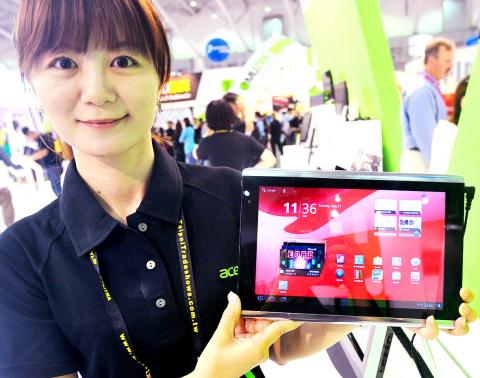Acer Inc’s (宏碁) share price fell limit down yesterday, a day after the company announced layoffs in Europe and an inventory write-off of US$150 million.
Analysts also predicted more problems ahead as the company faces long-term challenges in tapping into the fast-growing tablet computer market.
Acer closed down 6.99 percent at NT$51.90, as the company’s announcement of a new share buyback plan failed to lend support to its stock price.

Photo: Patrick Lin, AFP
Acer said on Wednesday it would repurchase 27 million of its shares on the open market from yesterday until Aug. 1 at between NT$55 and NT$80 per share.
“The massive write-off could bring Acer’s share price to below NT$50,” Citigroup Global Markets analyst Kevin Chang (張凱偉) said in a research note.
Citigroup slashed its earnings per share (EPS) forecast for Acer from NT$3 to between NT$1.50 and NT$2, citing the one-time writedown in the second quarter. It maintained its “sell” rating, with a target price of NT$35.
Calvin Huang (黃文堯), an analyst at Daiwa Securities Group Inc, also cut his forecast for Acer’s full-year EPS by 47.2 percent to NT$1.87.
“We are more pessimistic about the PC market and do not think Acer can sustain its earnings growth with new products in 2011,” Huang said in a report, citing his observation of Acer’s product showcase at Computex Taipei. “We don’t believe it can revive its earnings growth with these new products.”
Huang said Acer’s restructuring might take more than a year. Moreover, a lack of software development capability would be a major long-term challenge for the company, making it more difficult to differentiate itself from other PC brands, he said.
“Acer had been strong in the commodity PC market given its aggressive pricing, but the PC market is changing, with most users buying products for a good experience, instead of on the basis of low pricing,” he said.
Daiwa kept its “sell” rating and target price of NT$35.
If Acer decided to book the US$150 million write-off on European inventories and accounts receivable, as well as the US$30 million in layoff expenses in the second quarter, it might swing into a net loss in the quarter, compared with a net profit of NT$3.6 billion (US$125.4 million) during the same period last year, analysts said.
The proposed bonus cuts for executives and employees also pose a challenge as the move is likely to hit employee morale at a time when the company needs to engage more staff in research and development, they added.
However, an analyst at E.Sun Investment Consulting Co (玉山證券投資顧問) said he remained optimistic about Acer, with no bad news coming from its supply chain.
“It is better for the company to drop all the bombshells at the same time, as investors would think it’s already hit rock bottom,” he said.

Intel Corp chief executive officer Lip-Bu Tan (陳立武) is expected to meet with Taiwanese suppliers next month in conjunction with the opening of the Computex Taipei trade show, supply chain sources said on Monday. The visit, the first for Tan to Taiwan since assuming his new post last month, would be aimed at enhancing Intel’s ties with suppliers in Taiwan as he attempts to help turn around the struggling US chipmaker, the sources said. Tan is to hold a banquet to celebrate Intel’s 40-year presence in Taiwan before Computex opens on May 20 and invite dozens of Taiwanese suppliers to exchange views

Application-specific integrated circuit designer Faraday Technology Corp (智原) yesterday said that although revenue this quarter would decline 30 percent from last quarter, it retained its full-year forecast of revenue growth of 100 percent. The company attributed the quarterly drop to a slowdown in customers’ production of chips using Faraday’s advanced packaging technology. The company is still confident about its revenue growth this year, given its strong “design-win” — or the projects it won to help customers design their chips, Faraday president Steve Wang (王國雍) told an online earnings conference. “The design-win this year is better than we expected. We believe we will win

Chizuko Kimura has become the first female sushi chef in the world to win a Michelin star, fulfilling a promise she made to her dying husband to continue his legacy. The 54-year-old Japanese chef regained the Michelin star her late husband, Shunei Kimura, won three years ago for their Sushi Shunei restaurant in Paris. For Shunei Kimura, the star was a dream come true. However, the joy was short-lived. He died from cancer just three months later in June 2022. He was 65. The following year, the restaurant in the heart of Montmartre lost its star rating. Chizuko Kimura insisted that the new star is still down

While China’s leaders use their economic and political might to fight US President Donald Trump’s trade war “to the end,” its army of social media soldiers are embarking on a more humorous campaign online. Trump’s tariff blitz has seen Washington and Beijing impose eye-watering duties on imports from the other, fanning a standoff between the economic superpowers that has sparked global recession fears and sent markets into a tailspin. Trump says his policy is a response to years of being “ripped off” by other countries and aims to bring manufacturing to the US, forcing companies to employ US workers. However, China’s online warriors